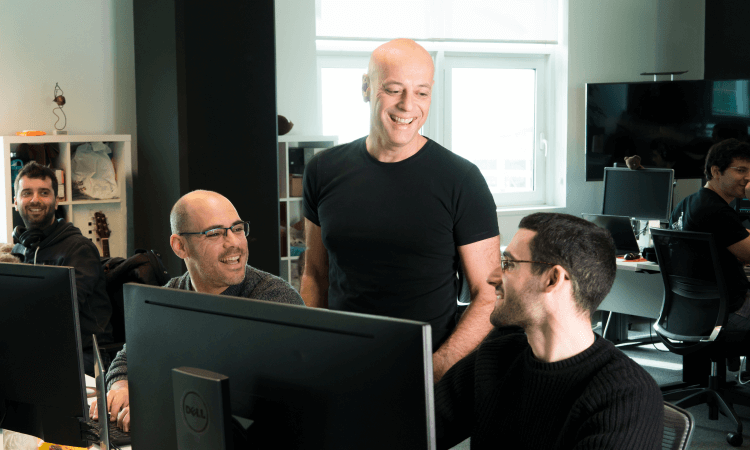
A Company’s Most Valuable Untapped Resource: Employee Developers and their Ideas for Change

The people working hard for your company are the experts in how the company works — after all, they’re there day in and day out, driving through the initiatives that lead to the outcomes determined by your business strategy.
In most businesses, the in-house experts are rarely the ones deciding the technology tools that are approved to use. But employees are often very happy to share their opinions with their supervisor or line manager (or indeed, anyone who will listen) on improvements that can be made to processes, how the company solves problems, how to work more productively or efficiently, and to the software tools they use daily.
The ability to see an improvement comes from the knowledge of daily practices and is one of the primary opportunities organizations should consider but often don’t. In fact, organizations can waste precious resources, such as with expensive consultants who often tell decision-makers what their employees already know. It’s important for organizations to listen to and use the expert resources they already have in their own knowledge workers.
Looking to the market leaders
Today’s big companies try to establish into their team culture an ethos of freedom and creativity. For example, Alphabet (Google’s parent company) allows for 20 percent of everyone’s time to dedicate to “moonshot thinking”: the pursuit of creative, sometimes out-there projects that could change the course of the company.
Companies that follow similar approaches and encourage big ideas from their own experts can apply systems of fast iteration on those ideas, test, refine, and improve in ways that, over time, greatly benefit the company.
People silos
Software is the most common technology tool used in business today, and organizations employ and/or outsource software architects and developers skilled in its creation. The software developer’s craft comes from years of learning, training, and experience, and is often regarded by non-developers as strange, hieroglyphic, arcane lore. But there’s incredible value in those mysterious skills.
Development departments are often separate entities in many organizations, sitting and working away from the operational staff and strategic planners, and separated from business strategy. That could be a costly structural oversight.
If we agree that employee ideas and creativity offer great value to the business, then organizational leaders will want to create opportunities for those ideas to weave into new technologies and tools that best serve strategic priorities. Additionally, breaking down team silos and integrating developer ideas across the business can support the process of strategic change and best align creative ideas with the strategic vision — at ground level.

Paulo Rosado – CEO of OutSystems. Source: OutSystems
OutSystems’ Vision
This alignment is one of the key points raised in this blog post by Paulo Rosado, the CEO of modern application development platform, OutSystems. In the post, Rosado calls for the intermingling of the people silos that tend to exist in most organizations today.
For more than 20 years, OutSystems has helped companies empower their teams to build the types of applications in software that make a difference, both through company strategy and individual creativity and productivity.
By having traditional developers, strategists, decision-makers, and others across departments collaborate around the process, the tools get built properly and with the business in mind. Hands-on developers, with a connection to strategic business goals, can add value to the business in ways not possible from those in silo-ed work structures or from outsourced support.
Clearly, the situation is more complex than this simple assessment, but the ideology has led to the success of Rosado’s company, OutSystems, over the last 20 years.
In a time when most organizations use more-or-less the same tools — SaaS services, common communications platforms, file sharing capabilities, financial reckoning software, and so forth — the interconnections between the tools and their bespoke applications are what differentiates a successful company.
Rosado’s vision is one where organizations can, as a collective endeavor, build applications that will change the way business works. From the basis of multiple common software tools deployed from public clouds or on-premise, companies build and iterate on the business applications that are crafted to the company’s strategies and objectives. The development speed, quality, and scalability of applications can change the business dramatically, as companies more efficiently hit their objectives using the expert tutelage of their valuable teams.
The creativity and power of many company resources simply lie dormant. Rosado and team have proven that that needn’t be the case, and gives their clients the means to create game-changing apps quickly, iterate and improve on them constantly, and better help businesses achieve their goals.
You can read more about Rosado’s ideas and vision in this blog post. And if you want to learn more about how businesses are changing with OutSystems, visit their blog and get in touch with the team to experience remarkable change in your own journey.
READ MORE
- The criticality of endpoint management in cybersecurity and operations
- Ethical AI: The renewed importance of safeguarding data and customer privacy in Generative AI applications
- How Japan balances AI-driven opportunities with cybersecurity needs
- Deploying SASE: Benchmarking your approach
- Insurance everywhere all at once: the digital transformation of the APAC insurance industry
